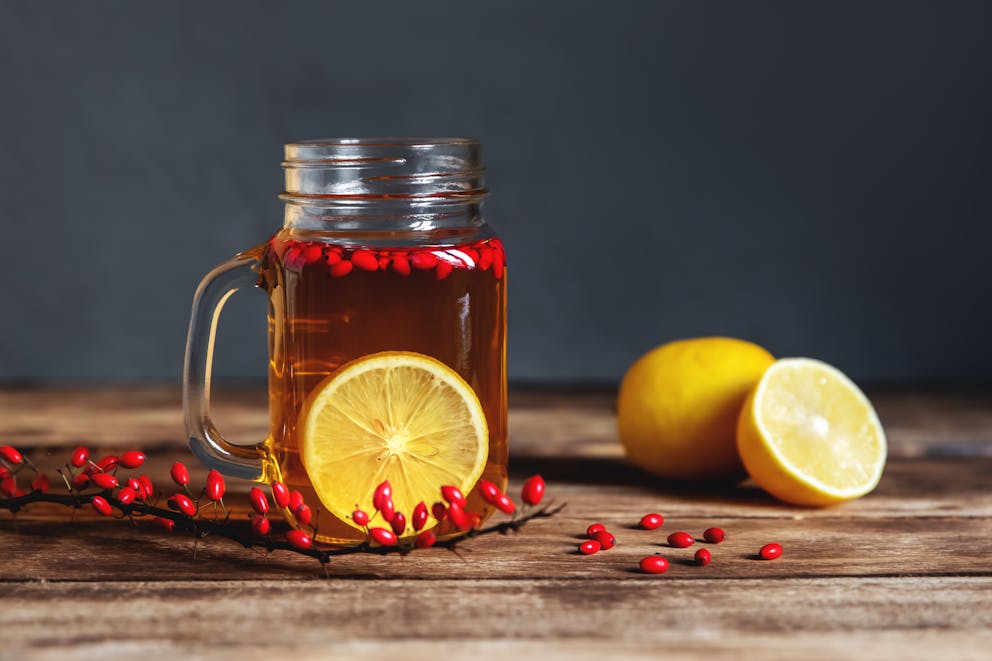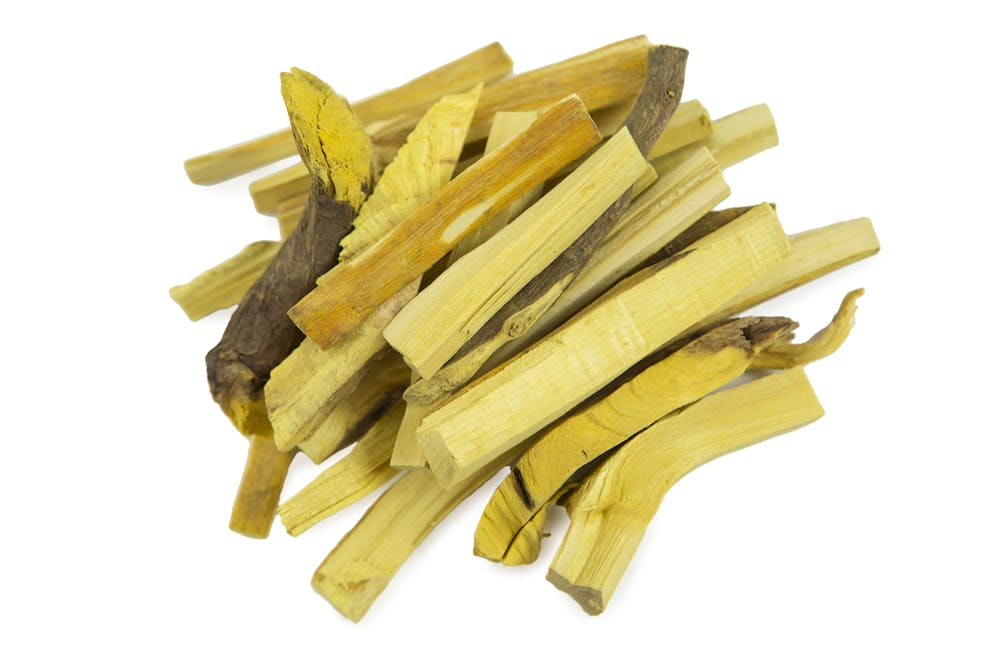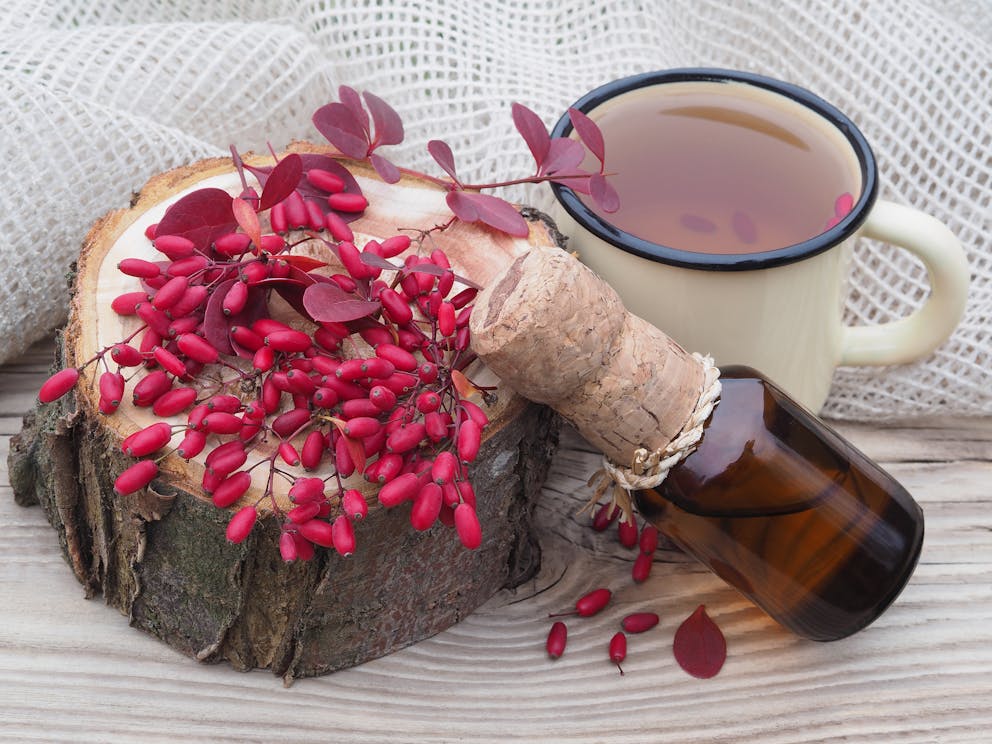Berberine in supplement form and in tea form, it is closely paralleled to Metformin and the list of benefits may be worth looking into...
The list of health benefits of Berberine is pretty significant. Especially how it helps the body regulate blood sugars helps support the liver, which we have suggested here as being the hub of our health, but by specifically getting rid of fatty liver disease, and righting our mitochondria issues, if any.
Check this out this informative video from Dr. Berg
The list of health benefits of Berberine is pretty significant. Especially how it helps the body regulate blood sugars helps support the liver, which we have suggested here as being the hub of our health, but by specifically getting rid of fatty liver disease, and righting our mitochondria issues, if any.
Check this out this informative video from Dr. Berg
Berberine tea is a herbal remedy made from the dried roots of plants rich in berberine—a potent phytonutrient that has gained the attention of medical researchers worldwide.
Evidence suggests that berberine lowers blood glucose, reduces high blood pressure, supports cardiovascular health, and may reduce your risk of metabolic syndrome, diabetes, and certain cancers.
Let’s look at the potential health benefits of berberine tea and find out why taking a berberine supplement may even prolong your life.

What is berberine tea?
Berberine is a naturally occurring compound found in several plants, including the barberry, goldenseal, tree turmeric, and Oregon grape.
Because berberine-containing plants aren’t commonly used for culinary purposes in Western cultures, dietary sources of berberine are limited.
However, because of its incredible health benefits, berberine is widely available in the form of tea, capsules, tinctures, and topical ointments.
Most berberine tea is made from the roots of the barberry shrub, also known as Berberis vulgaris. It can be consumed hot or cold and typically is served with lemon, cinnamon, or ginger to enhance its slightly bitter taste.
Berberine is an alkaloid phytochemical—a defensive compound that protects the plant by repelling herbivores, microbes, and pests and promotes self-healing, growth, and development.
Many of these alkaloid plant compounds also profoundly impact human physiology, which explains why berberine has been used as a natural remedy for treating a wide range of ailments for centuries.
Watch the video below to learn about the amazing benefit of berberine.
Berberine-containing remedies have a long history in traditional Chinese medicine and were frequently used to manage high blood pressure, microbial infections, blood sugar imbalances, and various other health problems.
Contemporary research confirms berberine’s numerous health benefits. A study published in Phytotherapy Research found that berberine may play a significant therapeutic role in treating chronic diseases, including heart disease and metabolic disorders such as insulin resistance and diabetes.
Here are eight incredible health benefits of berberine.
1. Blood sugar regulation
Berberine has profound benefits for metabolic health and can significantly improve insulin resistance, a metabolic imbalance that causes impaired blood sugar control and is the leading cause of diabetes.
Berberine may prevent and even reverse diabetes by increasing the number of insulin receptors on cell membranes which essentially enhances insulin’s ability to regulate blood sugar and control glucose metabolism in the liver.
In fact, a large review study published in Oxidative Medicine and Cellular Longevity summarizes, “Berberine has been demonstrated to have comparable effects in the treatment of diabetes with anti-diabetic drugs like metformin.”
2. Weight loss
While berberine isn’t a miracle cure for weight loss, it has been found to significantly decrease the body mass index of overweight and obese individuals.
Berberine increases the activity of AMP-activated protein kinase (AMPK), a crucial enzyme that plays a fundamental role in regulating energy metabolism.
Due to its AMPK-activating properties, berberine can enhance fat oxidation and inhibit fat synthesis, meaning it speeds up fat burning and slows down fat storage, which can help reduce fat mass and body weight.
 3. Cardiovascular health
3. Cardiovascular health
Taking berberine has shown great promise in lowering the risk of heart disease, heart attacks, and arrhythmia—an irregular heartbeat that can have serious health consequences.
Some evidence suggests that berberine has antiarrhythmic and cardioprotective properties. Berberine may inhibit specific potassium channels and helps to balance intracellular calcium levels, which are needed to regulate heart muscle contraction and may lower the risk of arrhythmias.
Berberine’s metabolic benefits also may improve several risk factors linked to heart disease, including:
- Imbalanced cholesterol
- High blood pressure
- Elevated triglyceride levels
- Imbalanced blood glucose levels
- Blood clotting disorders
4. Anti-inflammatory
While inflammation is a normal physiological response to injury and infections, chronic inflammation has detrimental impacts on the body.
Uncontrolled inflammation can significantly contribute to metabolic diseases, autoimmune conditions, cancers, neurodegenerative disorders, and various other health issues.
Berberine can inhibit several inflammatory molecules, including cytokines and interleukins, which play a crucial role in triggering and propagating inflammation in the body.
“By reducing the production of these proinflammatory compounds, berberine can help suppress chronic inflammation,” explains Dr. Berg. “This may explain why berberine intake is associated with a lower risk of a wide range of inflammatory conditions.”
5. Anti-microbial
In Ayurvedic medicine, berberine-containing remedies have traditionally been used for their antimicrobial properties to treat viral, bacterial, and fungal infections.
Berberine is a potent natural antibiotic that has shown to be particularly effective against E. coli, Staphylococcus, and Helicobacter pylori and may help to keep candida, fungi, and yeasts in check.
Research published in Frontiers of Microbiology found that berberine can inhibit the growth and replication of microbes by interfering with their cellular functioning, inhibiting DNA replication, and disrupting cell membranes.
In addition, berberine is a potent antiviral agent that may stop the replication of viruses such as hepatitis, influenza, and herpes simplex.

6. Immune system support
Berberine may be particularly beneficial for individuals with a weakened immune system.
Berberine has been shown to enhance the activity of macrophages, T cells, and natural killer cells. These crucial immune cells are needed to defend the body against pathogens, detect and eliminate cancerous cells and maintain balanced inflammatory responses.
There is also evidence that berberine promotes a balanced intestinal microflora by increasing beneficial bacteria, such as Bifidobacteria and Lactobacilli while reducing potentially harmful microbes.
Most of your immune system is in the gut, and promoting a diverse microbiota supports immune functions and helps protect against infections and disease.
7. Anti-cancer
Although more research is needed to establish the link between berberine and reduced cancer risk, there is preliminary evidence that berberine has impressive anti-cancer effects.
Berberine may have the ability to induce apoptosis, also known as programmed cell death, in abnormal cells that have cancerous characteristics, which may prevent the growth and proliferation of cancer.
8. Longevity
Berberine has shown promising anti-aging effects and may have potential benefits for longevity.
It has been proposed that berberine enhances longevity by activating AMPK, the enzyme that regulates cellular energy metabolism, maintains normal cellular functions, and stabilizes and repairs DNA.
Another way that berberine may prolong lifespan may be a result of its positive impact on metabolic health, resulting in a lower risk of insulin resistance, dyslipidemia, heart disease, and cancers, which may prevent premature death.

Berberine side effects and dosage
Berberine tea is generally considered safe and well-tolerated by most people. However, some individuals are sensitive to berberine or other compounds in berberine tea and can develop allergic reactions.
If you develop symptoms including itching, swelling, or difficulty breathing after consuming berberine, it’s crucial to seek medical attention immediately.
In addition, berberine supplements can cause gastrointestinal upset, and it’s recommended to take berberine with food to lower the risk of nausea, bloating, and abdominal discomfort.
If you want to take berberine as a health supplement, the typical recommended dosage ranges between 500-1500 milligrams per day, divided into two to three doses.
Berberine tea can vary in potency, and it's best to start with one cup per day and gradually increase your intake to a maximum of three cups per day.

Who shouldn’t drink berberine tea?
The safety of berberine during pregnancy and breastfeeding hasn't been adequately studied, and it’s recommended that mothers who are pregnant or breastfeeding, and those who are planning to conceive, avoid berberine-containing products.
Berberine has been found to modulate liver function enzymes which can alter the detoxification and metabolism of certain pharmaceutical compounds.
If you are taking cholesterol-lowering drugs, blood thinners, or medications to improve insulin sensitivity or blood lipids, it’s essential to discuss berberine with your healthcare provider.
In addition, berberine may lower HbA1C, a measure of average blood sugar levels, and berberine supplementation in combination with blood-sugar-lowering drugs can result in dangerously low blood sugar levels, also known as hypoglycemia.

How to make berberine tea
Berberine tea is traditionally made by steeping dried roots of the barberry plant in hot water for 10 to 15 minutes.
However, barberry root isn’t always readily available, and berberine tea bags are an excellent alternative. Follow the berberine tea instructions and let the tea bag steep in hot water until it reaches the desired strength.
Another way to prepare berberine tea is by using a powdered berberine supplement. Sprinkle one teaspoon of berberine powder into a cup of hot water and stir until the powder is completely dissolved.
You can add lemon, ginger, or cinnamon to mask berberine’s slightly bitter taste and use stevia or monk fruit to sweeten the tea if desired.

Key takeaways
Berberine possesses profound health-promoting properties that may prevent and even reverse insulin resistance and diabetes, protect from microbial infection, lower cancer risk, and potentially help prolong lifespan.
Because of berberine’s impressive health benefits, berberine supplements and berberine teas are readily available and may be particularly beneficial for individuals with diabetes, metabolic syndrome, obesity, and a weakened immune system.
If you are considering using berberine tea to promote a healthy body, it's best to start with one cup daily and slowly increase your intake to three cups per day to avoid side effects.
Eight benefits of berberine tea
Berberine-containing remedies have a long history in traditional Chinese medicine and were frequently used to manage high blood pressure, microbial infections, blood sugar imbalances, and various other health problems.
Contemporary research confirms berberine’s numerous health benefits. A study published in Phytotherapy Research found that berberine may play a significant therapeutic role in treating chronic diseases, including heart disease and metabolic disorders such as insulin resistance and diabetes.
Here are eight incredible health benefits of berberine.
1. Blood sugar regulation
Berberine has profound benefits for metabolic health and can significantly improve insulin resistance, a metabolic imbalance that causes impaired blood sugar control and is the leading cause of diabetes.
Berberine may prevent and even reverse diabetes by increasing the number of insulin receptors on cell membranes which essentially enhances insulin’s ability to regulate blood sugar and control glucose metabolism in the liver.
In fact, a large review study published in Oxidative Medicine and Cellular Longevity summarizes, “Berberine has been demonstrated to have comparable effects in the treatment of diabetes with anti-diabetic drugs like metformin.”
2. Weight loss
While berberine isn’t a miracle cure for weight loss, it has been found to significantly decrease the body mass index of overweight and obese individuals.
Berberine increases the activity of AMP-activated protein kinase (AMPK), a crucial enzyme that plays a fundamental role in regulating energy metabolism.
Due to its AMPK-activating properties, berberine can enhance fat oxidation and inhibit fat synthesis, meaning it speeds up fat burning and slows down fat storage, which can help reduce fat mass and body weight.
 3. Cardiovascular health
3. Cardiovascular health
Taking berberine has shown great promise in lowering the risk of heart disease, heart attacks, and arrhythmia—an irregular heartbeat that can have serious health consequences.
Some evidence suggests that berberine has antiarrhythmic and cardioprotective properties. Berberine may inhibit specific potassium channels and helps to balance intracellular calcium levels, which are needed to regulate heart muscle contraction and may lower the risk of arrhythmias.
Berberine’s metabolic benefits also may improve several risk factors linked to heart disease, including:
- Imbalanced cholesterol
- High blood pressure
- Elevated triglyceride levels
- Imbalanced blood glucose levels
- Blood clotting disorders
4. Anti-inflammatory
While inflammation is a normal physiological response to injury and infections, chronic inflammation has detrimental impacts on the body.
Uncontrolled inflammation can significantly contribute to metabolic diseases, autoimmune conditions, cancers, neurodegenerative disorders, and various other health issues.
Berberine can inhibit several inflammatory molecules, including cytokines and interleukins, which play a crucial role in triggering and propagating inflammation in the body.
“By reducing the production of these proinflammatory compounds, berberine can help suppress chronic inflammation,” explains Dr. Berg. “This may explain why berberine intake is associated with a lower risk of a wide range of inflammatory conditions.”
5. Anti-microbial
In Ayurvedic medicine, berberine-containing remedies have traditionally been used for their antimicrobial properties to treat viral, bacterial, and fungal infections.
Berberine is a potent natural antibiotic that has shown to be particularly effective against E. coli, Staphylococcus, and Helicobacter pylori and may help to keep candida, fungi, and yeasts in check.
Research published in Frontiers of Microbiology found that berberine can inhibit the growth and replication of microbes by interfering with their cellular functioning, inhibiting DNA replication, and disrupting cell membranes.
In addition, berberine is a potent antiviral agent that may stop the replication of viruses such as hepatitis, influenza, and herpes simplex.

6. Immune system support
Berberine may be particularly beneficial for individuals with a weakened immune system.
Berberine has been shown to enhance the activity of macrophages, T cells, and natural killer cells. These crucial immune cells are needed to defend the body against pathogens, detect and eliminate cancerous cells and maintain balanced inflammatory responses.
There is also evidence that berberine promotes a balanced intestinal microflora by increasing beneficial bacteria, such as Bifidobacteria and Lactobacilli while reducing potentially harmful microbes.
Most of your immune system is in the gut, and promoting a diverse microbiota supports immune functions and helps protect against infections and disease.
7. Anti-cancer
Although more research is needed to establish the link between berberine and reduced cancer risk, there is preliminary evidence that berberine has impressive anti-cancer effects.
Berberine may have the ability to induce apoptosis, also known as programmed cell death, in abnormal cells that have cancerous characteristics, which may prevent the growth and proliferation of cancer.
8. Longevity
Berberine has shown promising anti-aging effects and may have potential benefits for longevity.
It has been proposed that berberine enhances longevity by activating AMPK, the enzyme that regulates cellular energy metabolism, maintains normal cellular functions, and stabilizes and repairs DNA.
Another way that berberine may prolong lifespan may be a result of its positive impact on metabolic health, resulting in a lower risk of insulin resistance, dyslipidemia, heart disease, and cancers, which may prevent premature death.

Berberine side effects and dosage
Berberine tea is generally considered safe and well-tolerated by most people. However, some individuals are sensitive to berberine or other compounds in berberine tea and can develop allergic reactions.
If you develop symptoms including itching, swelling, or difficulty breathing after consuming berberine, it’s crucial to seek medical attention immediately.
In addition, berberine supplements can cause gastrointestinal upset, and it’s recommended to take berberine with food to lower the risk of nausea, bloating, and abdominal discomfort.
If you want to take berberine as a health supplement, the typical recommended dosage ranges between 500-1500 milligrams per day, divided into two to three doses.
Berberine tea can vary in potency, and it's best to start with one cup per day and gradually increase your intake to a maximum of three cups per day.

Who shouldn’t drink berberine tea?
The safety of berberine during pregnancy and breastfeeding hasn't been adequately studied, and it’s recommended that mothers who are pregnant or breastfeeding, and those who are planning to conceive, avoid berberine-containing products.
Berberine has been found to modulate liver function enzymes which can alter the detoxification and metabolism of certain pharmaceutical compounds.
If you are taking cholesterol-lowering drugs, blood thinners, or medications to improve insulin sensitivity or blood lipids, it’s essential to discuss berberine with your healthcare provider.
In addition, berberine may lower HbA1C, a measure of average blood sugar levels, and berberine supplementation in combination with blood-sugar-lowering drugs can result in dangerously low blood sugar levels, also known as hypoglycemia.

How to make berberine tea
Berberine tea is traditionally made by steeping dried roots of the barberry plant in hot water for 10 to 15 minutes.
However, barberry root isn’t always readily available, and berberine tea bags are an excellent alternative. Follow the berberine tea instructions and let the tea bag steep in hot water until it reaches the desired strength.
Another way to prepare berberine tea is by using a powdered berberine supplement. Sprinkle one teaspoon of berberine powder into a cup of hot water and stir until the powder is completely dissolved.
You can add lemon, ginger, or cinnamon to mask berberine’s slightly bitter taste and use stevia or monk fruit to sweeten the tea if desired.

Key takeaways
Berberine possesses profound health-promoting properties that may prevent and even reverse insulin resistance and diabetes, protect from microbial infection, lower cancer risk, and potentially help prolong lifespan.
Because of berberine’s impressive health benefits, berberine supplements and berberine teas are readily available and may be particularly beneficial for individuals with diabetes, metabolic syndrome, obesity, and a weakened immune system.
If you are considering using berberine tea to promote a healthy body, it's best to start with one cup daily and slowly increase your intake to three cups per day to avoid side effects.
FAQ
1. What is berberine?
Berberine is a potent alkaloid phytochemical that’s found in plants of the Berberidaceae family, such as barberry, goldenseal, tree turmeric, and Oregon grape.
Berberine protects plants from microbial infections and stimulates self-repairs, and has been found to have profound benefits for human health.
2. What is berberine tea?
Berberine tea is a herbal beverage made from dried roots of the barberry bush. It’s yellowish in color and typically has a bitter taste which explains why most people add lemon, ginger, or cinnamon to enhance its flavor.
Berberine-containing teas have been used for centuries in traditional Chinese and Ayurvedic medicine to treat a wide range of health issues.
3. What is berberine tea good for?
Berberine has an impressive number of health benefits. It has been shown to possess potent anti-inflammatory, anti-microbial, anti-cancer, and anti-aging properties.
Regular berberine intake has been linked with a lower risk of diabetes, metabolic syndrome, obesity, cancer, and heart disease and has potential benefits for immune functions, longevity, and weight loss.
4. Is there a downside to taking berberine?
While berberine is generally well tolerated, some sensitive individuals may experience gastrointestinal issues or allergic reactions.
5. What is the best way to take berberine?
Berberine-containing plants aren’t typically consumed in Western cultures, and berberine supplements or berberine teas are widely available and a convenient way to take this health-promoting phytochemical.
6. What does berberine do for the body?
Berberine has been found to lower inflammation, support the immune system, and promote weight loss and blood sugar control.
It also has been linked to a lower risk of infections, cancer, heart disease, and metabolic diseases such as insulin resistance and diabetes.
7. Is berberine and turmeric the same thing?
No, berberine and turmeric aren’t the same thing. They’re distinctly different compounds derived from different plants. Berberine is found in plants of the Berberis species, whereas turmeric is derived from the root of the Curcuma plant.
8. Can I have berberine on keto?
Yes, you can have berberine on keto as it doesn’t contain carbohydrates and won’t interfere with ketosis.
9. Can I drink berberine tea while fasting?
Berberine tea doesn’t contain calories and won’t break your fast. However, drinking berberine tea on an empty stomach can increase the risk of gastrointestinal side effects such as nausea or bloating, and it’s generally recommended to consume berberine tea in combination with food.
10. Does berberine tea help with weight loss?
Yes, berberine has been linked to significant weight loss in obese individuals. Berberine activates AMP-activated protein kinase, a crucial enzyme that promotes fat breakdown and inhibits fat storage, which can help to reduce fat mass and body weight.
11. How do I make berberine tea?
Berberine tea is traditionally made by steeping the dried roots of barberry plants for 10 to 15 minutes in hot water. Because dried barberry root can be challenging to find in Western parts of the world, using berberine tea bags or dissolving one teaspoon of dried berberine powder in hot water is an excellent alternative.
13. Who should avoid berberine?
Berberine should be avoided by individuals that are allergic to plants of the Berberis family. In addition, berberine has been found to interact with certain prescription drugs, such as blood sugar-lowering medications, statins, blood thinners, and anti-hypertensive drugs.
14. Can I have berberine tea while pregnant or breastfeeding?
Pregnant or breastfeeding mothers and those who are planning to conceive should avoid berberine-containing products as the safety of berberine during pregnancy and breastfeeding hasn't been adequate


No comments:
Post a Comment